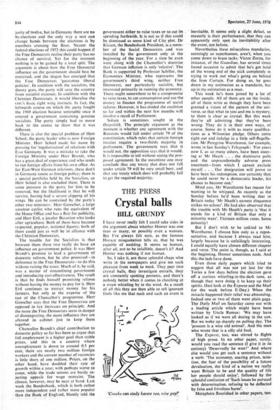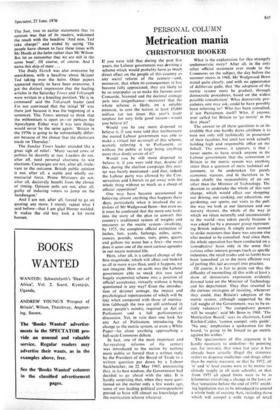THE PRESS
Crystal balls
BILL GRUNDY
I have never really felt I could take sides in the argument about whether Homer was one man or many, or possibly even a woman. But I've always felt sure, as the famous Horace misquotation tells us, that he was capable of nodding. It seems so human, after all, not to be infallible, doesn't it? And Homer was nothing if not human.
So, I take it, are those splendid chaps who write in the newspapers and give me such pleasure from week to week. They peer into crystal balls, they investigate entrails, they are constantly spotting portents, and there's nobody better when it comes to clutching at a straw whistling by in the wind. As a result of all this they are then able to tell ignorant fools like me that such and such an event is
'Crooks can study karate too, wise guy?
, inevitable. It seems only a slight defect, so masterly is their performance, that they can apparently only spot its inevitability after the event, not before.
Nevertheless these miraculous mandarins, seemingly so superhuman, aren't, when you come down to brass tacks. Victor Zorza, for instance, of the Guardian, has several times found occasion to admit that he's got hold of the wrong end of the stick completely in trying to work out what's going on behind the Iron Curtain. For doing so, he goes down in my estimation as a mandarin, but up in my estimation as a man.
This week he's been joined by a lot of other people. All of them are on the inside, all of them write as though they have been granted a vision of the pattern of the uni- verse, so that what to you and me is mystery, to them is clear as crystal. But this week they're all admitting that they've been wrong. They do it in their own ways, of course. Some do it with as many qualifica- tions as a Wilsonian pledge. Others come right out and indulge in a little self-flagella- tion. Mr Peregrine Worsthorne, for example, wrote in last Sunday's Telegraph: 'For years now I, as so many others, have been sneer- ing at Mr Heath . . . the dismissive polls and the unprecedentedly adverse press treatment—from which I cannot exclude myself . . . Our denigration will prove to have been his redemption, our certainty that he could never be a democratic leader, his chance to become one.'
Mind you, Mr Worsthorne has reason for wanting to be whipped. As recently as the Sunday before he'd been writing that in Britain today `Mr Heath's earnest eloquence strikes no echoes'. He had also observed that the trouble with Mr Heath's party is 'that it stands for a kind of Britain that only a minority want'. Thirteen million votes. Some minority!
But I don't wish to be unkind to Mr Worsthorne. I choose him only as a repre- sentative, and because I always read him, largely because he is unfailingly interesting. I could equally have chosen different chapter and verse. The point is, though, as I said at the beginning, Homer sometimes nods. And ' this the lads have done.
Even those daily papers which tried to suggest that all was not yet lost for the Tories a few days before the election gave off a curious whistling-in-the-dark tone, as though they were doing it to keep up their spirits. (Just look at the Express and the Mail for the week before E-Day.) When the miracle happened their relief was abounding. Indeed one or two of them went plain gaga. The Daily Mail on Saturday came out with a leading article which might have been written by Uncle Remus: 'We may have looked as if we were all dozing in the sun. But we woke up sharply on polling day. The 'possum is a wise old animal'. And the man who wrote that is a silly old fool.
The Express, too, was stirred to flights of high prose. In no other paper, surely, would you read the sentence (I give it in its entirety) 'Deservedly he won!' And where else would you get such a sentence without a verb: 'The economy, soaring prices, taxa- tion, the fear of the possibility of a future devaluation, the kind of a nation we really want Britain to be and the quality of life her people should enjoy', followed by the splendid confusion of 'Such issues he pursued with determination, refusing to be deflected by false and frivolous hares'.
Metaphors flourished in other papers, too.
The Sun, true to earlier statements that its opinion was that of its readers, welcomed the result with the headline 'And now, Ted take charge!' and ended by saying 'The people have chosen to face these times with Mr Heath at the helm rather than Mr Wilson.. But let us remember that we are still in the same boat'. Of course, of course. And I name this ship of state ...
The Daily Sketch was also overcome by seasickness, with a headline about Skipper Ted taking over the helm. Other papers appeared merely to have been overcome. I got the distinct impression that the leading articles in the Saturday Times and Telegraph were written in a kneeling position. 'He is in command' said the Telegraph leader (and I'm not convinced that the initial 'H' was there just because it was the beginning of a sentence). The Times seemed to think that the millennium is upon us—or perhaps the Apocalypse. Either way it was sure things would never be the same again : 'Britain in the 1970s is going to be substantially differ- ent because of the choice that the electorate made on Thursday.'
The Sunday Times leader sounded like a great sigh of relief: 'Many sacred cows of politics lie decently at rest. Leaders do not, after all, need personal charisma to win elections. Campaigns are not, after all, irrele- vant to the outcome. British public opinion is not, after all, a stable and wholly un- mercurial force. Prime Ministers do not, after all, decisively benefit from the choice of timing. Opinion polls are not, after all, guilty of inducing voters to jump on the bandwagon.'
And I am not, after all, forced to go on quoting any more. I merely repeat what I said before—that I am glad Homer nodded. It makes the old boy look a lot more human.































 Previous page
Previous page